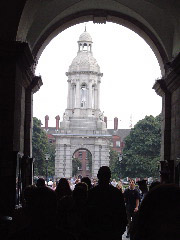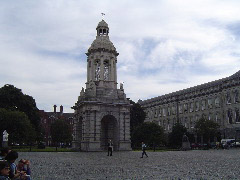
 "Hey!
How's school going? I heard you're doing your
Masters in knitting! How'd you manage THAT?"
Although slightly inaccurate, one thing is
sure: word travels fast among fellow knitters.
I tell them I am getting a Masters of Philosophy
in Ethnic and Racial Studies. The inquiries
usually stop there with a polite smile.
"Hey!
How's school going? I heard you're doing your
Masters in knitting! How'd you manage THAT?"
Although slightly inaccurate, one thing is
sure: word travels fast among fellow knitters.
I tell them I am getting a Masters of Philosophy
in Ethnic and Racial Studies. The inquiries
usually stop there with a polite smile.
Sometimes, more venturesome
individuals ask about the topic of my dissertation.
The working title is "The esoteric underpinnings
of hand knitting in late modernity: An auto
ethnographic exploration into knitting circles
among university students in Canada".
I think some background
information is required at this point. I am
from Cambridge, Ontario, originally. I finished
my undergrad degree in anthropology at the
nearby University of Guelph in 2003. Four
fantastic years at Guelph had left me with
the desire to further my academic studies,
and to branch out a little further from home.
A little further away turned out to be Dublin,
Ireland. Quite a jump.
A few years ago,
I had traveled Ireland with a friend. Of course,
when in Dublin, every tourist absolutely must
see the Book of Kells. The Book of Kells is
housed right in the middle of Trinity College,
a branch of the University of Dublin, which
is over 400 years old. The campus, located
in the heart of the city center, is absolutely
marvelous. A collage of old stone buildings
with flourishing green squares and cobblestone
pathways. I fell in love.

 So,
applying to Trinity College for a Masters
program was an easy choice.... Awaiting a
reply was a bit more difficult, Irish time
moves at a much more relaxed pace. To my delight,
I was accepted. Last October, I packed up
whatever belongings I could fit into two suitcases,
and peregrinated the Atlantic.
So,
applying to Trinity College for a Masters
program was an easy choice.... Awaiting a
reply was a bit more difficult, Irish time
moves at a much more relaxed pace. To my delight,
I was accepted. Last October, I packed up
whatever belongings I could fit into two suitcases,
and peregrinated the Atlantic.
Thinking that I was
going to have no trouble building up a stash
in the land of wool, (after all, that is what
we North Americans knitters think, right?)
I packed only my essentials: my needles and
other knitting accoutrements. I also took
what I believed to be a rather modest collection
of yarn. Some hot pink Lopi, bulldog blue
Lamb's Pride, an assortment of Philosophers'
Wool, and really, only about a dozen other
random balls, hanks, and skeins of yarn. A
conservative stash, right? My flatmates in
the graduate residence though otherwise. You
see, the knitting phenomenon hasn't hit the
Irish university student population the way
is has in North America or even the United
Kingdom. Knitting in Dublin is not a popular
activity with younger people.
Just as I was having
anxiety about being labeled "the crazy yarn
girl downstairs', the last of our six rooms
in the flat was filled by Rachel, a wonderful
tricoteuse from New York City, who had also
brought a stash. Hooray! I am not the only
one! Better yet, I had someone to share with
and talk to about my moderately obsessive
passion for knitting. As the months carried
on, and graduate students sporadically emerged
from their somewhat isolative studies, Rachel
and I began to meet other knitters, mostly
of North American origin, who had come to
Trinity to do a masters or PhD, who also thought
that they were the only knitters on the island.
We would get together whenever our studies
would allow, to knit together, seek advice,
teach new knitters who wanted to learn, and
gripe about the lack of yarn in the city --
our combined stash was becoming sparse.
Rachel and I soon
made it our mission to seek out yarn stores
in Dublin. This country was known for their
sheep. Aran sweaters were the coveted souvenir
for so many tourists. So why couldn't we find
yarn in the city? The truth is, because hand
knitting is no longer economical, and knitting
as an activity of leisure is not popular,
there is not a strong demand for yarn here.
I have found more Irish yarn available at
home in Canada. So desperate, I began accosting
old ladies I saw knitting while waiting for
the bus. More than happy to share, they told
me of two shops in the center of Dublin that
sold yarn. Both of these shops are not very
big, and the selection is not very great,
even to those who have only a whiff of yarn
snobbery.

 The
best yarn store Rachel and I found was in
Bray. Bray is a 35-minute train ride out of
Dublin on the east coast of Ireland. It's
a very touristy place during the summer. The
coast is beautiful, and the climate is temperate
enough even for the odd palm tree to grow.
We found The Wool Shop located at the top
of the hill on the main street. The Shop is
very small. So small, that a generously sized
pram could potentially create a traffic jam
of customers if positioned correctly. No sooner
had we found the wall of Rowan when a pram-induced
traffic jam began. Things became more hectic
when a second pram, unfazed by the apparent
challenge of squeezing anyone else into the
store, let alone another baby carriage, miraculously
positioned herself and her pram just inside
the door. Not one to run from a challenge,
I maneuvered my way around the prams and patrons
and somehow managed to escape with some super
soft kid mohair for a baby blanket (I paid,
don't worry). Phew!
The
best yarn store Rachel and I found was in
Bray. Bray is a 35-minute train ride out of
Dublin on the east coast of Ireland. It's
a very touristy place during the summer. The
coast is beautiful, and the climate is temperate
enough even for the odd palm tree to grow.
We found The Wool Shop located at the top
of the hill on the main street. The Shop is
very small. So small, that a generously sized
pram could potentially create a traffic jam
of customers if positioned correctly. No sooner
had we found the wall of Rowan when a pram-induced
traffic jam began. Things became more hectic
when a second pram, unfazed by the apparent
challenge of squeezing anyone else into the
store, let alone another baby carriage, miraculously
positioned herself and her pram just inside
the door. Not one to run from a challenge,
I maneuvered my way around the prams and patrons
and somehow managed to escape with some super
soft kid mohair for a baby blanket (I paid,
don't worry). Phew!
Sedated by the rhythmic
clacking and swaying of the train, content
in the warm glow of the sun that hit my face
through the window, I reclined in my seat
a bit more, amazed at what I was willing to
do to get good yarn. In anthropological terms,
there are many similarities between life in
Ireland and life in Canada. So back home,
why was knitting so much more popular than
here, especially with people my age? I played
with the lofty idea of being able to incorporate
knitting into my upcoming dissertation topic,
but passed it off as wishful thinking.
My dissertation topic
search was quickly becoming the cause of mounting
panic. I wanted to do something that was not
only applicable, but something that I was
really interested in. In Ethnic and Racial
studies, which is basically an extension of
sociology and anthropology, the focus is on
human identity, language, expressive culture,
intercultural communication, migration, as
well as the heavier stuff like human rights,
racism, inequality, and the really upsetting
stuff like ethnocide and genocide.
Although I strongly
believe that investigation and research into
areas of the heavier side of ethnicity are
much needed and invaluable contributions within
academia, my personal choice for a dissertation
topic leaned towards areas that I had been
most passionate about and happy studying.
My personal choice, possibly a selfish one
in terms of my own mental health, was to focus
on a positive, creative aspect of my own culture.
I had decided that I really did want to investigate
knitting as an activity that increasing numbers
of people my age had recently picked up.

 I
tossed the idea out to my supervisor rather
sheepishly. I was elated when she smiled,
and in her fantastic Israeli-Irish accent
said, "I think that's a wonderful idea!
Tell me more!" As our chat unfolded,
I discovered that she, having lived in Ireland
since 1969, used to knit all the time, had
taught herself Aran sweater patterns. She
had given it up years ago but often thought
about starting again. The next time we met,
I brought in some yarn and a pair of needles
for her.
I
tossed the idea out to my supervisor rather
sheepishly. I was elated when she smiled,
and in her fantastic Israeli-Irish accent
said, "I think that's a wonderful idea!
Tell me more!" As our chat unfolded,
I discovered that she, having lived in Ireland
since 1969, used to knit all the time, had
taught herself Aran sweater patterns. She
had given it up years ago but often thought
about starting again. The next time we met,
I brought in some yarn and a pair of needles
for her.
Since that chat,
which took place back in January of this year,
I have been at work on my dissertation. I
have been narrowing down the focus, doing
literature reviews, and designing my methodology.
As it turns out, this will be the first sociological
study on university knitters in North America.
Actually, not much has been written from a
sociological perspective about knitting in
general. I have discovered a Masters thesis
that was researched on Newfoundland women
who knit for charity, but not much else seems
to exist...yet.
I will be examining
the ideas surrounding theories of identity
and modernity (the complexity of which I will
spare you from), and simply document stuff
that we knitters know about our habit. Why
we knit, the benefits of knitting for ourselves
and for others, why we like knitting in groups,
what the knitting community offers to its
members. We all get it; that's why we do it.
Informing non-knitters is the challenge. It
is hoped that my dissertation will act as
a starting point for further, more in-depth
study.
Now I am back at
home in Cambridge, conducting interviews,
and doing participant observation in knitting
circles at the moment, which really is blissfully
tailored study for me. Of course, there is
much work to be done, and there are challenges.
But I get to knit while I hold interviews,
analyze knitting books for content, read popular
articles on knitting, reach out to amazing
people who are also passionate about knitting,
talk to owners of local yarn stores, and really
get a feel for what is going on, all while
accomplishing stuff for my schoolwork.
There are grandmothers
who have proudly told their friends of my
"Masters in Knitting" it's a good conversation
starter. There are friends who are slowly
coming to realize that I have substantial
research to do. There are also critics who
scoff at my topic, who discount it as easily
as they devalue any kind of handwork primarily
done by women. Coming at the topic from a
feminist ethnographic perspective, I am also
faced with criticism towards the choice of
qualitative, open interviewing and the narrative
style analysis of detail-rich data that I
am producing. I have learned to avoid these
critics, as efforts to inform them have led
to nothing but frustration on both sides.
This is all part of the journey, and will
be included in my dissertation.

 I
had a wonderful time in Ireland. Searching
out yarn stores was a great way to learn the
city. My flatmates were full of kind words
of encouragement and enthusiasm way back when
my dissertation topic was just a dream. Whether
in our kitchen, on the bus, or in the pub,
knitting with my flatmates became one of my
favorite activities. So, as it winds up, I
kind of am doing my Masters in knitting....
I just have to carefully qualify what that
means.
I
had a wonderful time in Ireland. Searching
out yarn stores was a great way to learn the
city. My flatmates were full of kind words
of encouragement and enthusiasm way back when
my dissertation topic was just a dream. Whether
in our kitchen, on the bus, or in the pub,
knitting with my flatmates became one of my
favorite activities. So, as it winds up, I
kind of am doing my Masters in knitting....
I just have to carefully qualify what that
means.

